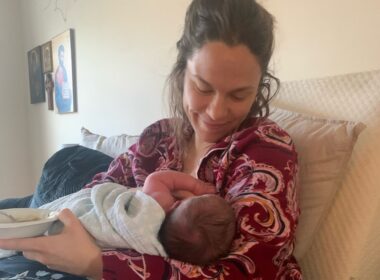In his book, Further Along the Road Less Traveled, Dr. Scott Peck describes how, on the first day of his honeymoon, all the romantic feelings he’d had for his new bride were suddenly gone. It was a major crisis: did he make a mistake? Did he lie to himself and to her? Was she the wrong woman for him?
What he discovered was that true love, love that endures, is much more than the emotionally intense feelings one has during romantic experiences. These feelings are not unimportant, but there is much more to love–so much more.
How does one find true love, then? If true love between a man and a woman is learned, grows over time, and is more than just a fleeting emotional experience, or a path towards self-actualization, I contend that Natural Family Planning (NFP), especially in today’s culture, is a path towards true love in its fullest form: Agape, Philia and Eros*. How do I know? I recently sat down with and listened to the lessons learned from dozens of couples who have practiced Natural Family Planning in their marriages for 20 to 30 years.
I am here to testify that I saw true love among these couples.
Through NFP, couples learned to know themselves and each other
The first step to love is to know. You can’t love what you don’t know! The practice of NFP opens a window into the mystery of the woman’s body, cycles, and fertility, for her and her husband alike.
“You don’t see it because you don’t know, and then all of a sudden you start seeing it: it reveals your body to yourself,” one woman said.
”Learning about the fertility of a woman” was the biggest surprise for a husband, “that fertility is such a huge aspect of who a woman is.”
Because of this daily awareness of the cycle, men reported becoming more in-tune with their wives. A husband mentioned how “it led to more bonding, to get to know your spouse better, better understanding of her being a woman.”
They learned from NFP how to be vulnerable
To really know someone, that person has to open the door, and let you into the most intimate aspects of themselves. NFP helps couples do that. It leads women to open up about an intimate part of themselves, and to overcome the feelings of stigma and shame some may have about their fertility and sexuality.
One wife shared with me how she “hated the [NFP] class,” as she was embarrassed by the information about her body that was presented in it–and ashamed that her husband was there to hear it. But later on, she was surprised by “how comfortable I have become with my husband being part of that.” In other words, it was a huge step towards bonding, authentic intimacy, and meaningful self-love and acceptance.
Similarly, with NFP, a husband has a chance to be open about his own sexual urges and needs for intimacy: “You know she can see your weaknesses and your defects, but she helps you correct them in a formative and charitable way.”
They learned empathy and understanding by using NFP
To use NFP effectively, couples have to communicate regularly about a woman’s menstrual cycle, their needs and desires, and their openness to getting pregnant at a given time. It is therefore an ongoing, monthly conversation that takes practice and time to become comfortable with, but my research showed that the process is worthwhile.
As one husband explained, “Being in tune with your wife’s cycle builds empathy and understanding. It’s a unitive process not just during the act but in between, not just during sex, and in a real way, not just emotional.”
Another reports: “It has helped me respect my wife’s body, to be patient and understanding of how it works.”
A wife shares: “My husband also started thinking more about me, he started dating me again, and it helped him gauge when it was more important to be there for me, to bring flowers or go out to dinner.”
They learned to trust each other
“It took two years for us to lift the fear we had of having children. We would fight over charting, I would try to take control. The beginning was to trust each other,” reports a husband of 30 years.
A wife shared how they became better aware of the importance of working together as a team, “because there were times when I was feeling ‘Oh, I’m kind of alone with this.’”
Another wife reported that “It made us more aware of how we communicate and its impact.”
A wife explained that once she really learned to chart with her husband’s help, “there was a lot more than charting. It brought a lot of peace and harmony.”
They learned to be other-centered
Clearly, the disciplines of charting, periodic abstinence, and communicating effectively are difficult. But they build virtue, perspective, and appreciation for the gift of the other.
“Virtue is exercise, and NFP is a tool to keep marriage in a constant exercise mode, not get lazy, out of shape, make assumptions” reports one wife. NFP is a strategy to be completely other-focused. “It takes a while. You start off polarized, and move from being the center to seeing the marriage as a whole.”
A husband shared how he “learned patience, compassion, to go outside myself and think about my spouse.”
As this wife expressed, this strength “bleeds into other areas: strength of character, it’s not all about me. It made me more kind with people who are struggling.”
They learned to love physically in a deeply intimate way
NFP enhances intimacy beyond what most people know, as a man in his early 50s and father of eight reported: “I have a better memory of sexuality lived in chastity by being attentive to the limit (of abstinence), than the sexuality of the beginnings of marriage, which was more spontaneous. A chaste sexuality that is regulated, temperate, is more human, it is deeper, it is more intimate, it is more tender.”
A wife shared how, after they stopped using contraception and started using NFP, “it opened communication up. One day he told me “the sexual act means so much more to me in this union;” it made me cry.”
NFP and periodic abstinence taught this husband “to cherish the time we come together as the gift it is and provide the most I can.”
As they practiced NFP, they became one, in joy and in grief
I could see through these interviews that NFP had brought these couples together in a powerful, unitive process. Working diligently through these challenges together bore great fruits for the couples in my research.
One husband shared about “the absolute oneness it cultivates and brings into our marriage. It forced us by its very nature to cultivate that oneness.”
A wife of 28 years told me: “With birth control, I can imagine that’s very isolating, you hide things from your husband. With NFP, there is nothing like that, you’re both in it together, it’s always together. It affects all areas, how we work together with the children, with our older parents, with everything. We’re really a team.”
Another wife explained how it “brought us together as a couple, it was very unifying for us. Our pregnancies were very difficult, but we were always on the same page.” She goes on to share: “Looking back, when we lost our son, our way of grieving was very different. I see how people who lose a child split up. NFP is what kept us together. I fell apart right away while he was managing the funeral. Then 6 months later, when we started talking about trying again, he fell apart. NFP gave us something to come back to that we were doing together, it was a small step to get back together.”
Couples found that practicing NFP is not easy, but it leads to great good
I don’t want to paint too rosy a picture of NFP: it is hard and it is life-changing, in equal measure. My conclusion from these conversations is that for those seeking true love with patience and determination, they will find it through the path of NFP.
Of course, although it is an effective way to plan a family, NFP can feel like an immense burden when it is lived with too much focus on avoiding or achieving pregnancy. Many of the couples I interviewed went through such phases, but they overcame them, realizing that being too focused on one aspect of their sexuality was hurting their relationship. It was a journey. On the other side, they found true love.
“It’s like the life of prayer,” said a wife in her 60s. “You have to cultivate and learn. You know the deep reason, clear orientation, why you’re doing it. It takes work and it’s worthwhile, and we love each other. It’s the best way to love.”
If you are interested in Natural Womanhood’s full report on the lived experience of NFP, visit this page for more details.
*These are each Greek words referencing different types of love. While the English language has just one word for ‘love,’ the ancient Greeks understood ‘eros’ to be sexual attraction or romantic love, ‘philia’ as friendship, the love between friends, and ‘agape’ as the self-sacrificing love that seeks the good of the other over the good of oneself.
Additional Reading:
Is Natural Family Planning Unnatural for Relationships?
Husbands Share Their Thoughts on NFP







